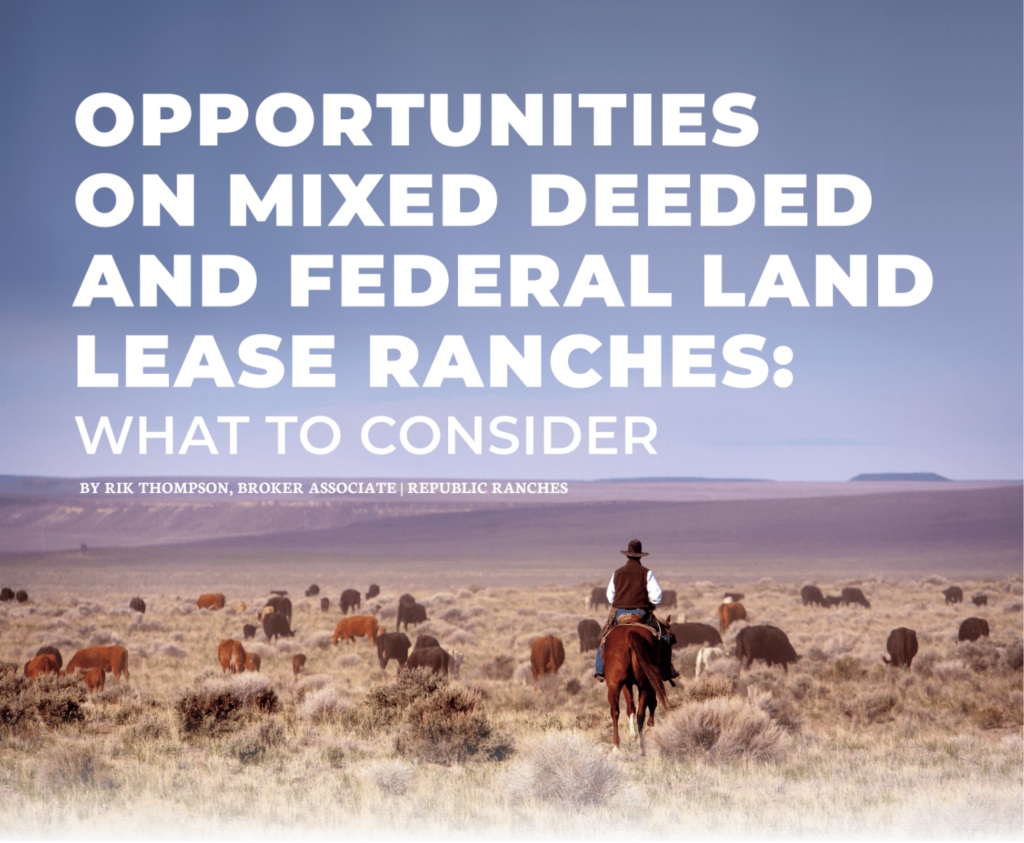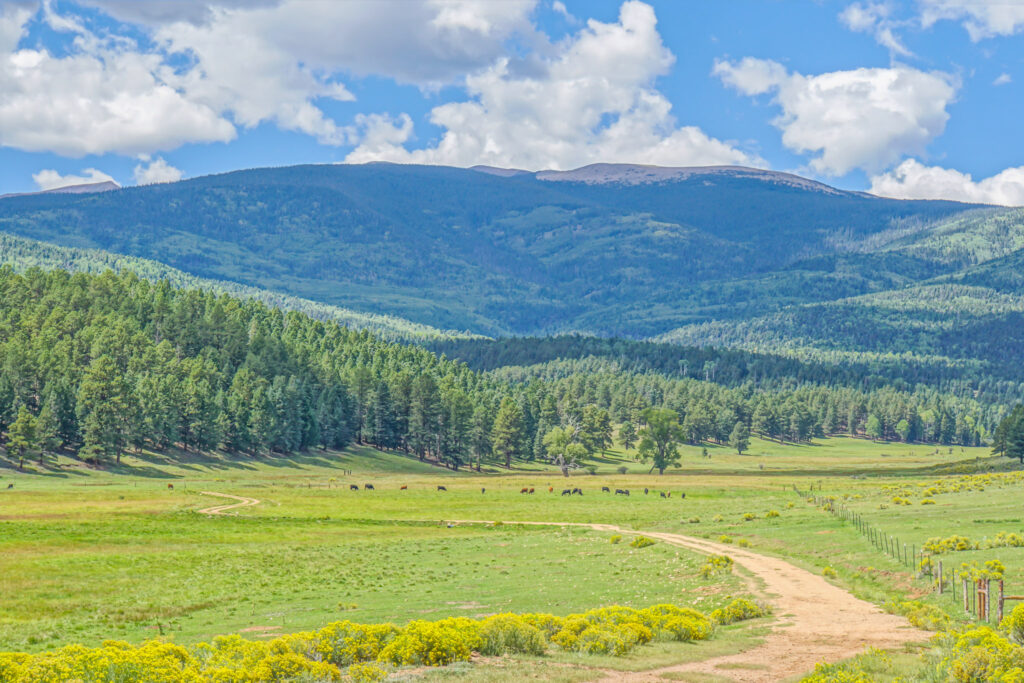By Rik Thompson, Broker Associate, Republic Ranches

In a previous article, I discussed the initial thought process for the purchase of your first ranch as a business proposition. Many factors will determine the various revenue opportunities and limitations for your ranch business. The location of your ranch and the makeup of the types of land control and ownership are likely the major factors. There are other considerations, though.
Here in the western United States, many, if not most, large ranches of five thousand acres or more are a mix of deeded and some type of federal government leased land. (Note: Although we are addressing federal land in this article, many ranches here in New Mexico also have New Mexico State Trust Lands as part of the grazing operation.) This mix of land ownership type is a large factor in the potential opportunities that may be available to the ranch operator. Some of those other factors are:
- The federal government agency which is leasing the land to the rancher. United States Code and department regulations and policy will govern the regulation of grazing permits and other permitted uses for National Forest, National Grassland, and Bureau of Land Management.
- Geographic location of the ranch.
- Other entities who need access to or across the land, or for other permitted uses of the land, both deeded and leased. This can be oil and gas producers, pipeline companies, other extractive companies (miners, gravel or caliche pits, water suppliers, etc.), wind or solar companies, and so on.
- Status of mineral rights and water rights on the deeded and leased portions of the ranch.
The US Forest Service (USFS) and the Bureau of Land Management (BLM) both issue grazing permits for much of the federal land under their management. The vast majority of those grazing permits are in current use. When purchasing a ranch that utilizes a USFS or BLM grazing permit as part of the operation, it is vital to understand the type and terms of the permit associated with the ranch operation. There are standardized USFS and BLM processes for transferring the grazing permit to the new owner, and they are different in many ways. Some things to review and consider as part of your purchase decision process:
- If considering the purchase of a ranch utilizing a USFS grazing permit, review the current USFS Grazing Permit Administration Handbook; it is readily available online.
- For both USFS and BLM, study the actual grazing permit itself. Read the fine print—and read the whole thing a few times. Individual permits will describe terms and conditions that must be followed by the operator, such as term of permit (usually ten years), season for use each year, kinds and numbers of livestock, movement criteria, range condition limitations… you get the picture.
- For both USFS and BLM permits, the permittee must own the “base property” associated with the permit, though there are some exceptions for BLM permits. I think of this as the Ranch Headquarters.
- For USFS permits, the permittee must own the livestock that will be grazing on the permit. That is also the case for most BLM permits I am familiar with, but it could be different on your permit.
- Limitations on ownership types (personal, business, estates, trusts, etc.) are more specific on USFS grazing permits than on BLM permits, but regardless of the agency, the specific regulations need to be followed to the letter.
- A USFS permit must be personally “validated” by a USFS employee verifying that the appropriate number of livestock have been turned out on the permit allotment.
- Do I need to make improvements such as water systems, wells, fencing, pens, riparian area protection, etc., and will the government allow that? Who will own those improvements?
- Consult an attorney familiar with federal land grazing permits, and have him or her review these permits, as well as the overall ranch opportunity. This is very important!
There are other permitted uses of USFS and BLM lands that may be available for a ranch operator to consider. Some of these may include oil, gas, and mineral exploration and development; alternative energy development, such as geothermal, solar, and wind; recreational development (think ski areas), and many others. Most ranchers are not interested in those types of uses, but these special use permit operations may impact your grazing operation as well, so you need to know about them. There are times when you could be compensated by another permittee because of interruption to your grazing operations.
The bottom line is that a USFS or BLM grazing permit is just that — a permit for regulated grazing only — nothing else. The permittee does not own the land, and cannot utilize it for other uses unless the government agrees. That could involve applications for special use permits, or, at a minimum, an agreement with the government to allow other uses. You can’t “lock the gate” on your USFS or BLM land (of course, you can control access through your own deeded lands), so you will likely have hunters, fishermen, campers, and hikers using the land as well.
There are plenty of rules and regulations when utilizing federal lands in your grazing operations. Here in New Mexico, most large ranches have those permits as part of their operation. If you are willing to build a good working relationship with the agency employees managing those permits; do your homework; make sure you stay within the limits of the permit, and pay your fees on time, a mixed deeded and public lands ranch can be a very good way to operate a large ranching operation in an economical and profitable manner.
One final thought: As a group, ranchers are an independent type, and many times are suspicious of the government and its employees, but during an informal discussion I recently had, a government land manager told me he works hard with his permittees to coordinate different uses, and wants to see all of them be successful in their operations. I have been told the same from the ranching side on numerous occasions. Don’t be afraid to consider a mixed deeded and federal grazing permit ranch… it could be an excellent business decision for your operation. Just ask questions, and do your due diligence!
